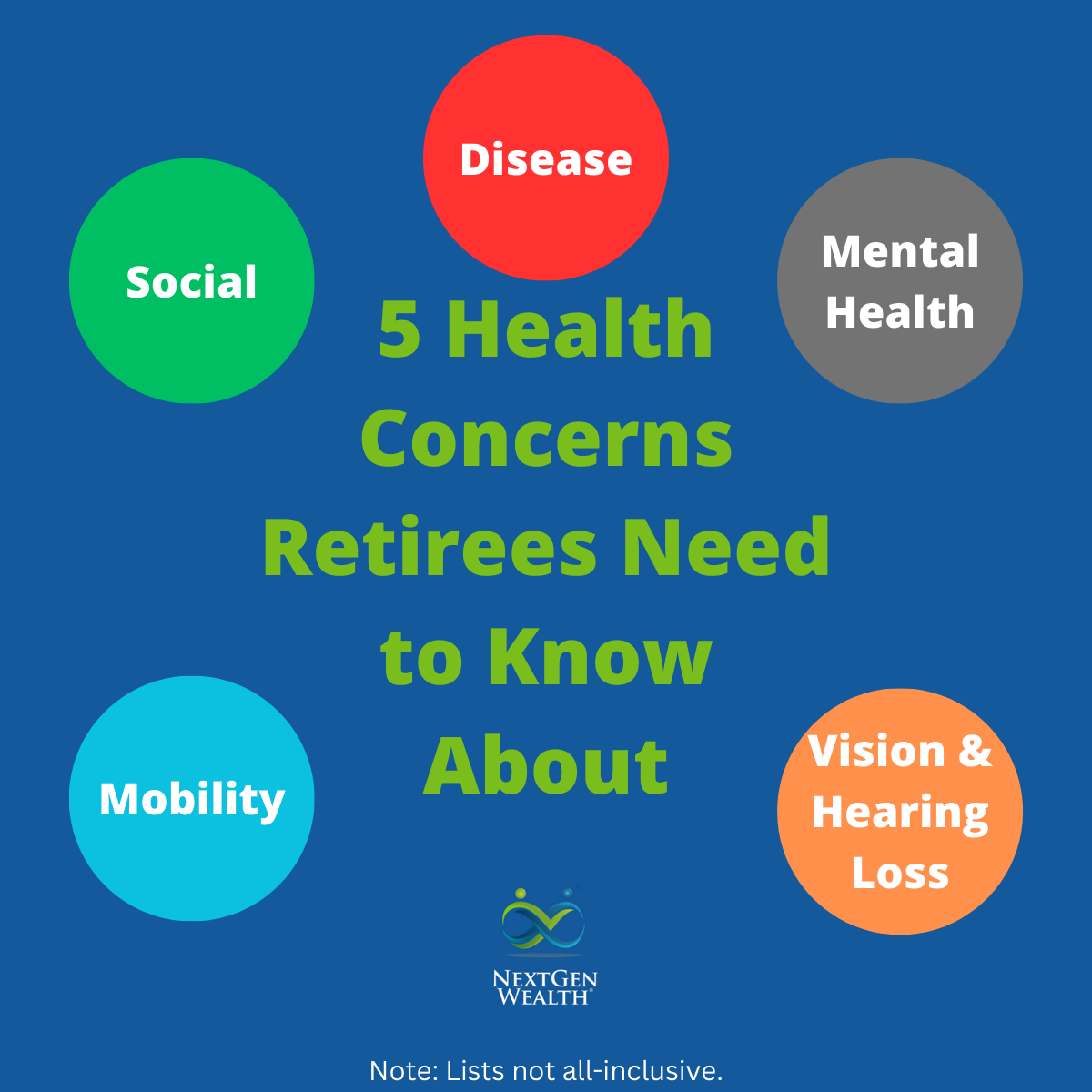5 Health Concerns Retirees Need to Know About: Are You Prepared?

Retirement is an exciting phase of life where you can finally relax and enjoy the fruits of your labor. However, it's essential to maintain good health in retirement to make the most of it. As we age, our bodies undergo various changes, making it crucial to take extra care of our health.
In this article, we'll explore some tips for maintaining good health in retirement, including staying socially engaged, pursuing hobbies and interests, practicing mindfulness and relaxation techniques, regular check-ups with healthcare providers, and staying up to date on preventative health measures such as vaccines and screenings.
Chronic Diseases
Chronic diseases such as heart disease, diabetes, and arthritis are among the most common health concerns for retirees. As people age, they become more susceptible to chronic illnesses, which can be debilitating and expensive to manage. It’s crucial you stay on top of your health by maintaining a healthy lifestyle and visiting your doctor regularly.
Mental Health Issues
Mental health issues such as depression and anxiety can also be prevalent among retirees. Retirement can be a significant life transition which can trigger feelings of loneliness, isolation, and a loss of purpose.
These feelings can lead to mental health problems, which can be challenging to manage on your own. You should prioritize your mental health by staying socially active, seeking professional help when necessary, and practicing stress-reducing activities such as meditation or yoga.
Vision and Hearing Loss
Vision and hearing loss are also common health concerns. As you age, your eyesight and hearing often deteriorate, making it difficult to complete everyday tasks. If you have these conditions, you should visit an eye doctor or audiologist regularly to monitor your condition and receive proper treatment.
Mobility Issues
Mobility issues can also affect you as you age. Limited mobility can make it difficult to perform everyday tasks and lead to feelings of isolation and depression.
You should stay active by engaging in low-impact exercises such as walking, swimming, or yoga. You should also consider making modifications to your home to improve accessibility.
Cognitive Decline
Finally, cognitive decline, such as Alzheimer's and dementia, is also a significant concern. These conditions can be devastating for you and your family, making it crucial for you to prioritize brain health.
It’s recommended you engage in activities to challenge your cognitive abilities, such as learning a new language or completing crossword puzzles.
You should also eat a healthy diet and exercise regularly to promote brain health. While it's not possible to predict the future, being aware of these health concerns can help you prepare and plan accordingly.
Tips for Maintaining Good Health in Retirement
Staying Socially Engaged
Staying socially engaged is a vital aspect of maintaining good health in retirement. Research has shown social isolation and loneliness can have adverse effects on both your physical and mental health.
You should make an effort to stay connected with friends and family, join social clubs or groups, and participate in community events. Volunteering is also an excellent way to stay socially active while contributing to a worthwhile cause.
Pursuing Hobbies and Interests
Pursuing hobbies and interests is another important aspect of maintaining good health in retirement. Hobbies and interests provide a sense of purpose and fulfillment and can also help reduce stress and anxiety.
You should take the time to explore new hobbies and interests or rediscover old ones. Whether it's painting, gardening, playing an instrument, or traveling, pursuing these activities can help you stay active and engaged.
Practicing Mindfulness and Relaxation Techniques
Practicing mindfulness and relaxation techniques can also be beneficial. Meditation, yoga, and deep breathing exercises can help you reduce stress, lower blood pressure, and improve overall well-being. Practicing these techniques regularly can also help improve your sleep quality, which is essential for maintaining good health.

Regular Check-ups with Healthcare Providers
Regular check-ups with healthcare providers are crucial for you to maintain good health. Routine screenings and check-ups can help detect and manage health issues before they become more severe. You should schedule regular appointments with your primary care physician, as well as any specialists you may need to see.
Staying Up to Date on Preventative Health Measures
Staying up to date on preventative health measures, such as vaccines and screenings, is also important. Vaccines can help prevent illnesses such as the flu and pneumonia, while screenings can help detect conditions such as cancer and heart disease early on. You should talk to your healthcare provider about which vaccines and screenings are recommended for your age and health status and make sure to schedule appointments accordingly.
Support Systems for Retirees with Health Concerns
Support systems are essential if you have health concerns. You may require assistance with daily tasks, transportation to doctor appointments, and emotional support to manage these challenges. Family members and friends can provide valuable support, but professional support systems may also be necessary.
Home health aides can assist with daily tasks, and visiting nurses can provide medical care at home. Senior centers and community organizations can also offer resources and social activities to keep you engaged and supported. It's essential for to identify and utilize the support systems available to manage your health concerns effectively.
Family and Friends
Family and friends can be a critical support system if you have health concerns. They can offer emotional support, help with daily tasks, and provide transportation to medical appointments. Having a strong network of family and friends can help you feel connected and less isolated, which can have a positive impact on your overall health and well-being.
Support Groups and Community Resources
Support groups and community resources can also be beneficial if you have health concerns. These groups provide a sense of community and can offer information and resources specific to a particular health condition. Support groups can also be a place to share experiences and connect with others who are going through similar challenges.
Professional Caregivers and Healthcare Providers
Professional caregivers and healthcare providers are an essential support system if you do have health concerns. Caregivers can assist with daily activities, such as bathing, dressing, and medication management.
Healthcare providers can monitor chronic conditions and provide treatment and recommendations for maintaining good health. You should communicate openly with their caregivers and healthcare providers to ensure you receive the best possible care.
Maintain A Fulfilling Life After Retirement
Maintaining good health in retirement requires a proactive approach to prevent and manage health concerns. Being aware of the five health concerns we discussed, including chronic diseases, mental health issues, vision and hearing loss, mobility issues, and cognitive decline, is essential to prepare and plan accordingly.
It's vital to take care of yourself by staying socially engaged, pursuing hobbies and interests, practicing mindfulness and relaxation techniques, regularly checking up with healthcare providers, and staying up to date on preventative health measures such as vaccines and screenings.
At NextGen Wealth, we understand the importance of having a comprehensive plan for retirement, including a health plan to meet your unique needs. Contact us today to learn more about how we can help you prepare for a healthy and fulfilling retirement.



